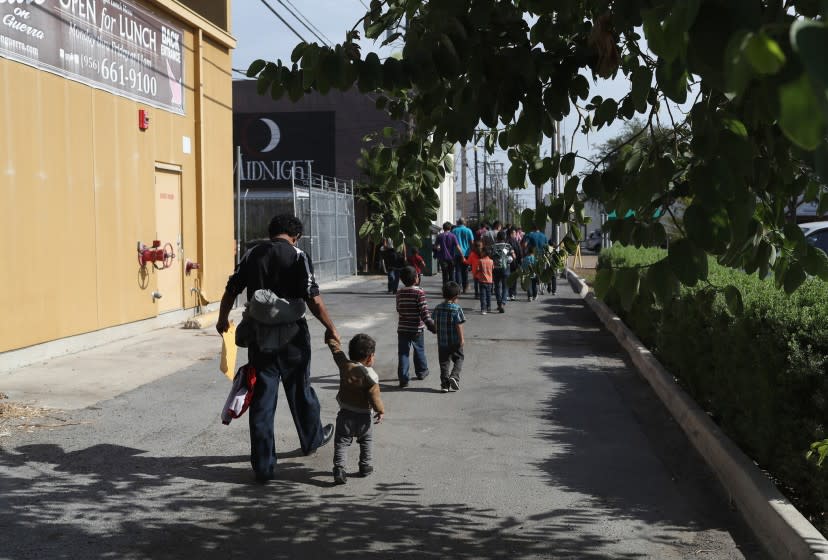Op-Ed: When Trump says immigrants don't show up for court hearings, he couldn't be more wrong

Last week, during the final presidential campaign debate, President Trump renewed a claim he has often made: Migrants with pending court dates rarely show up for their hearings. In response to the charge by his Democratic challenger, former Vice President Joe Biden, that the administration’s treatment of would-be immigrants was inhumane, Trump told debate watchers that the number who “come back” to immigration court is “less than 1%."
The government’s data, however, tell a far different story.
In a study published this year, we found that 83% of migrants asked to return to court attended all their hearings. We analyzed 11 years of records, from 2008 through 2018, kept by the Executive Office for Immigration Review, the government agency that runs U.S. immigration courts. Reality is a far cry from Trump's assertions.
On top of the falsehood that migrants “never come back,” the president added a second: “Only the really — I hate to say this — but those with the lowest IQ, they might come back.” More nonsense. There are no such data — nothing in the record — to justify such a comment.
Nor are migrants who have been released pending court hearings “murderers,” “rapists” or “very bad person[s]” — more assertions from Trump’s Thursday debate answers. Study after study has shown that noncitizens are less likely to commit crimes than native-born Americans. Yet, Trump has repeatedly relied on this flawed narrative of immigrant criminality to justify his cruel immigration policies, including the zero-tolerance policy that resulted in horrific separations of thousands of children from their parents.
Our study found that when migrants do miss an immigration hearing, they often later come back to court to comply with the law. The immigration court records show that 15% of the small percentage who at first failed to appear later rectified the matter. This statistic is especially significant because it represents cases that judges were willing to reopen, which means the migrants had legitimate reasons for missing their earlier hearings. Among those reasons: inadequate notice from the government about where and when they were supposed to show up.
In fact, immigration courts are beset by a systemic failure to provide migrants with proper information regarding hearings, dates and times. In 2018, an attorney for the Department of Justice admitted before the Supreme Court that “almost 100%” of the notices to appear in immigration court omitted the time and date of the future hearing. Under those conditions, it is a wonder that 83% of those ordered to appear managed to do so. The COVID-19 pandemic has surely made these notice problems worse.
If the White House wants to improve appearance rates, it could make use of strategies that have been proved to work. One such effort, the federal Family Case Management Program, begun in 2016, used one-on-one managers to help individuals released from detention in dealing with court orders. When the Department of Homeland Security’s Office of Inspector General reviewed the program in 2017, it found that 100% of the participants had attended every one of their court hearings. The Trump administration discontinued the case management program the same year.
More is at stake here than just getting the statistics right. The Trump administration has consistently relied on claims that immigrants “never” come to court to justify punitive turns in immigration policy such as keeping migrants locked in prisons, prosecuting asylum seekers for illegal entry and forcing vulnerable migrants into camps in Mexico while they await consideration they are entitled to under the law.
The Trump administration cannot justify these policies based on data. The president’s falsehoods must not be allowed to stand unchallenged.
Ingrid Eagly is a law professor at UCLA. Steven Shafer is a managing attorney for the Esperanza Immigrant Rights Project in Los Angeles.
This story originally appeared in Los Angeles Times.

